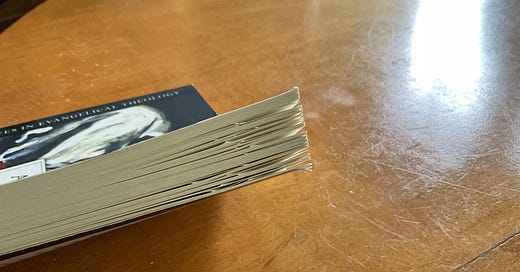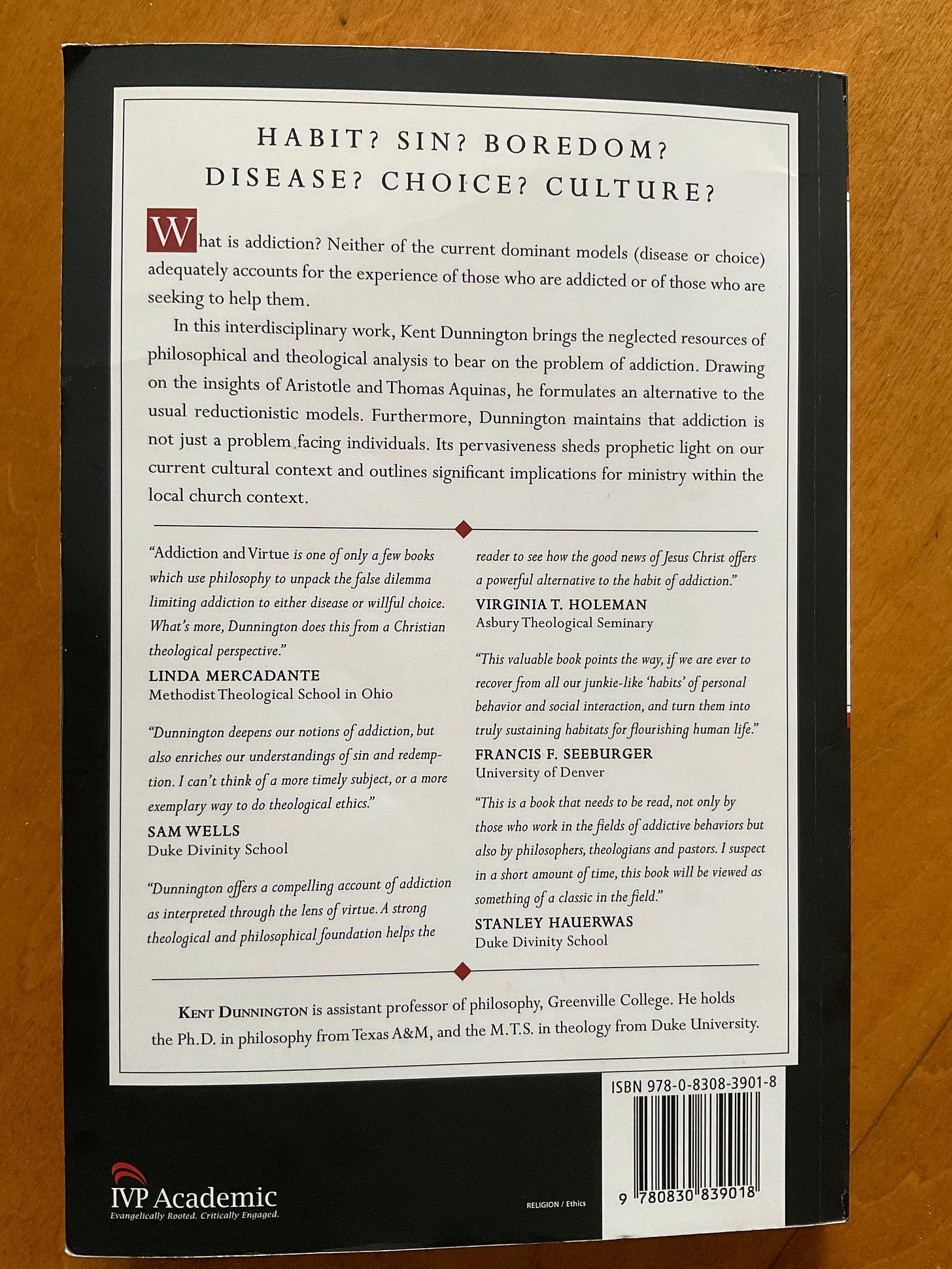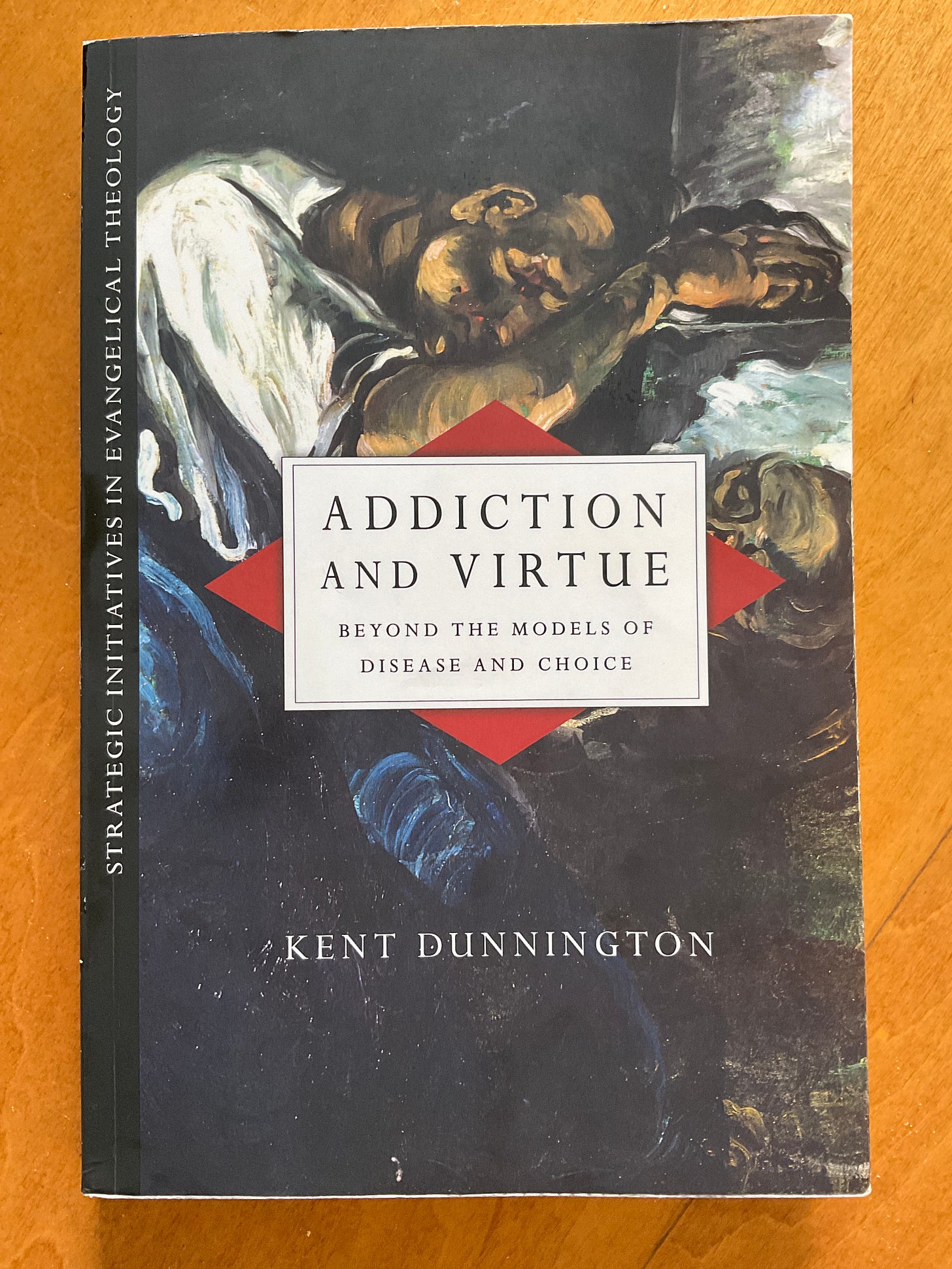Book Review: “Addiction and Virtue: Beyond the Models of Disease and Choice” by Kent Dunnington
If we went for a coffee today, undoubtedly, I would bring up this book in conversation, or include some insight or truth that I’ve gleaned from it. I loved it.
How did I get it?
I don’t know. It showed up in a parcel from Amazon at my door a couple of weeks ago. I don’t know who sent it to me. In fact, Gen and I have had a couple of conversations about it because it’s such a mystery.
My best guess is that one of you sent it to me! I did a review of “UTurn For Christ 2” and “The Recovery Minded Church” recently, and maybe, one of you loved me enough to send me this book? If so, please contact me and identify yourself so that I can say thank you directly.
What is it about?
This book was published in 2011 from IVP Academic (Intervarsity Press). The author, Kent Dunnington at the time of publishing was an assistant professor of philosophy at Greenville College. He’s now an associate professor of philosophy at Biola University.
The author is arguing that describing addiction as a disease has some significant problems. It also doesn’t fit well as a choice, because so many people have reported how they were acting against their will in addiction.
He argues that addiction is better described the way that Aristotle and Thomas Aquinas defined “habit.” Because we are generally unfamiliar with their writings, especially on this topic, Kent takes a significant amount of time to tease out all the meanings and definitions and makes a strong, convincing case.
He goes on drawing from Thomas Aquinas to provide a robust definition of sin and then shows how addiction fits well within that robust definition.
And, then, he turns and shows how the phenomenon of addiction is a critique on Western culture, and how we came to be in this moment where addiction is epidemic. That chapter, chapter 5 “Addiction and Modernity” is an exquisite summary of the philosophical beliefs of our culture and their origins.
The book closes with a devastating and accurate critique of the evangelical church and our interaction and lack of interaction with addiction. He makes some perceptive observations and offers insight into both addiction and our church cultures that are very, very helpful. It felt prophetic.
What did I think?
If you were to look at my copy of this book, you’d see how much I dog-eared and underlined and marked. I loved this book.
The writing is heady and wordy. I had to reach a few times to follow his argument, but I loved every minute of it. I read some of it aloud to my family and they had trouble following it. They could see how much I enjoyed it though.
What was remarkable to me was seeing not only this deep and rich philosophical journey into Aristotle, Aquinas and our cultural moment, but seeing all the quips and quotes and slogans from the recovery community and how they point to the reality of the author’s point. It all resonated for me.
I have lots of excerpts and quotes marked up. Let me share more than I should:
“The disease concept of addiction is routinely applied to wealthy addicts while the general public persists in thinking of poor addicts as morally depraved.”
“The goal of moral training is the formation of moral habits because habit names the possibility of acting well without the exertion that is required of deliberative practical reasoning.”
“Just as we cannot do calculus indefinitely without exhausting ourselves, neither can we deliberate indefinitely about practical dilemmas without exhausting ourselves. Deliberative action is inherently fragile and unstable because it requires an agent with finite powers to engage in an activity that tends to deplete those powers.”
“… Aristotle answers his own question, ‘What ought we to do when at leisure?’ with the response: ‘Clearly we ought not to be amusing ourselves, for then amusement would be the end of life.’ For Aristotle, we only know how to spend our leisure time if we know what our lives are for and the end to which our lives are to be directed.”
“Aquinas contends that unlike our other appetites—appetites for food, sex, wealth and so on—our appetite for God need not, indeed should not, be subject to any moderation. Temperance is to love the sensory pleasures of taste and touch with moderation. Justice is to love the good for another with moderation. Courage is to love the goods of life and honour with moderation. But charity is to love God without moderation. In fact, the measureless love of God that is charity, since it rightly orders all other acts to its own end, has the quality of imposing measure on every other habit. If we love God without limit, Aquinas thinks, we will find that we love every other good proportionately. Charity, therefore, directs us toward an object that we are to pursue without restraint, and charity promises us that extremism in this one direction will translate into right action in every other direction.”
“One of the great insights of A.A. And of the twelve-step recovery model in general is the recognition of the addictive habit’s recalcitrance to direct deliberation and willpower. It is for this reason, for example, that only one of the twelve steps—the first—even mentions alcohol. The other eleven steps can be understood as exhortations to address the problem, not by tackling it straight on, but rather by adopting alternative patterns of thought and action that may gradually reeducate and reform the habituated mind. The wisdom of the twelve-step program lies in the recognition that the habit of addiction can only be supplanted through the development of another habit that is as pervasive and compelling as the habit of addiction. One way of life can only be supplanted by another, and for this reason A.A. Is rightly understood by its members to be a way of life: ‘The program is a plan for a lifetime of daily living’ (AA 317.)
“That deep friendships are in fact necessary to the life of recover is widely acknowledged. The overwhelming majority of addicts testify to the power of friendship as the single most important factor in their recoveries from addiction.”
‘Perhaps, unlike the addict, we have not demanded an all-consuming purpose, a coherent and integrated life, and an ecstatic participation in some all-sufficient and transcendent good. For so long we have told ourselves that, in the words of the Rolling Stones, ‘you can’t always get what you want,’ and we have used this justification to dull and suppress our deepest longings for rest, peace and joy. We have settled instead for a life of respectability, and we respond to our boredom, loneliness and internal disorder through distraction and diversion. For many of us, the church represents this life of respectability from which we must occasionally escape by going on “moral holiday.” For others of us, the church is itself a distraction and a diversion, a place where we go to play a part, to stroke the ego, to be entertained, to socialize, or to get a little “chicken soup for the soul.” Thus, when confronted with the addict, we doubt that the gospel has the power that is needed to rescue the addict, for we know that in a very real sense teh addict has a fierce and desperate need that is foreign to us and for which we do not have a response.”
“We recognize that our own lives are not interesting and beautiful enough to offer a genuine alternative to the addict…”
“The question that addiction puts to the church is whether or not it can offer a convincing alternative to the addicted life, and that challenge addiction presents to the church is whether or not it can embody the purposive, ecstatic, and all-consuming love of God in a way that is more compelling than the life of addiction.”
In answer to these last handful of quotes, I couldn’t help but think how U-Turn For Christ ranches are embodying this very thing, and leading people into a new way of living life, establishing new habits, based in the limitless virtue of charity, supplanting a consuming life of addiction, with the compelling life of a Christian.
Obviously, I resonated with this book. I’ve already shared it with a couple of people. I’m hoping to read it again, this time with at least one friend that we can discuss our way through it.
Conclusion:
Heady. Wordy. Philosophical. Brilliant.
I’m very grateful for whoever it was that sent this to me.
soon!
andy






